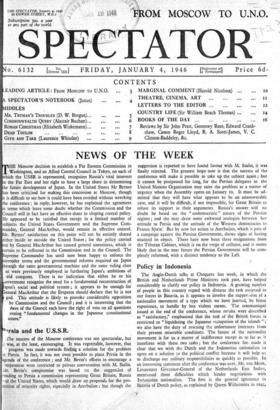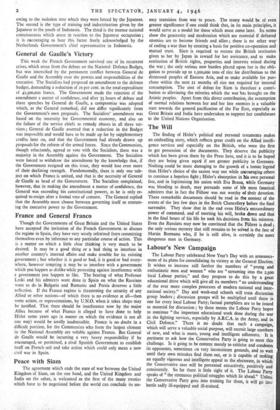Policy in Indonesia
The Anglo-Dutch talks at Chequers last week, in which the British and Netherlands Prime Ministers took part, have helped considerably to clarify our policy in Indonesia. A growing number of people in this country regard with distaste the task assigned to our forces in Batavia, as it appears to involve the suppression of a nationalist movement of a type which we have learned, by bitter experience, to handle by less violent means. The communiqué issued at the end of the conference, whose results were described as " satisfactory," emphasised that the task of the British forces is restricted to " liquidating the Japanese occupation of the islands " ; we also have the duty of rescuing the unfortunate internees from their present miserable conditions. The future of the nationalist movement is for us a matter of indifference except in so far as it interferes with these two tasks ; but the conference has made it clear that we wish the Dutch and the Indonesian nationalists to agree on a solution to the political conflict because it will help Lp. to discharge our military responsibilities as quickly as possible. In an interesting statement after the conference was over, Mr. van Mook, Lieutenant Governor-General of the Netherlands East Indies, mentioned three difficulties which hinder negotiations with Indonesian nationalists. The first is the general ignorance in Batavia of Dutch policy, as explained by Queen Wilhelmina in 1942, owing to the isolation into which they were forced by the Japanese. The second is the type of training and indoctrination given by the Japanese to the youth of Indonesia. The third is the intense national consciousness which arose in reaction to the Japanese occupation ; it is encouraging to hear this factor freely acknowledged by the Netherlands Government's chief representative in Indonesia.
































 Previous page
Previous page